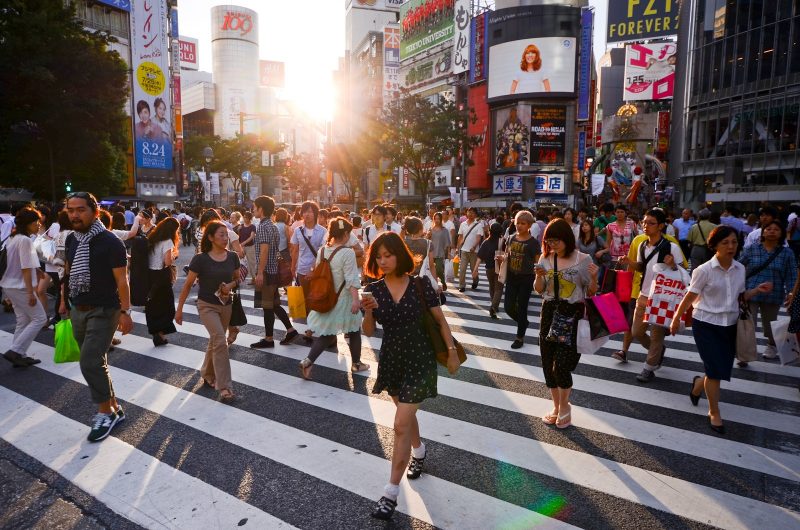Japan at a GDP crossroads

Will Japan move beyond "Abenomics" and GDP-measured growth in the upcoming election?
Japan faces a snap election on December 14th with Prime Minister Shinzo Abe’s “Abenomics” on trial. From the conventional economics perspective of GDP-measured growth, we are told that Japan is “stagnating” with excessive debt. Economists dispense their usual bromides: “open up the economy”; “join the Transpacific Partnership”; “cut government spending”; “tax more”; “tax less”; “print money” – lurching between austerity and stimulus.
As I wrote in August 2001 in Nikkei Ecology, from a futurist’s perspective all this advice is nonsensical and today even more so. Japan is still undergoing the now global transition of mature industrial economies from short-term material economic growth at whatever social and environmental costs – to a more mature, long-term, system-wide social development. As other countries in Europe, North America and now China, India and Brazil face the same breakdown of GDP-growth policies, new national scorecards and metrics of company success are emerging.
From the OECD comes the Better Life Index; from Canada, the Canadian Index of Wellbeing; while the European Parliament’s Beyond GDP Conference in 2007 led to a proliferation of broader scorecards focused beyond cash-flow accounting which even its inventor Simon Kuznets warned was not a measure of national progress. Citizens in twelve countries polled by Globescan and Ethical Markets approved adding measures of health, education and environment. The UN sponsored a global debate in 2012 on Bhutan’s Gross National Happiness (GNH).
Japan has the opportunity on December 14th to break away from the past GDP-growth stage. In recent years, all the social and environmental costs are being forced back onto national accounts and company balance sheets. Energy and materials efficiency is the new focus, along with renewable energy, re-manufacturing, recycling and sustainable cities and infrastructure. Japan’s economy is twice as energy efficient as that of those in North America. Exergy studies focus on how much energy in an economy is actually applied to useful work – and how much is wasted through inefficiency. After Fukushima, many see Japan’s solar, wind and geothermal energy as the cleanest, safest way forward, yet its electric utilities are blocking their access to transmission grids (“Electricity Firms in Japan-Solar Shambles”, The Economist, November 29, 2014).
“ My advice to Japanese voters and Mr. Abe is to change the national scorecard from GDP to a system-wide view of Quality of Life.”
My advice to Japanese voters and Mr. Abe is to change the national scorecard from GDP to a system-wide view of Quality of Life. Social and environmental costs (the “bads”) must also be subtracted from the goods, while valuing the services and information sectors that now comprise some 70-80% of mature, post-industrial societies in Japan, Europe and North America. GDP still over-values 19th and 20th century material goods while manufacturing has shrunk to less than 20% of their output.
Similarly, company accounting is modernizing with new standards to account for the six forms of capital which companies can enhance or degrade: financial, manufactured, intellectual, social, human and natural capitals. These new report cards on company performance are promoted by broad coalitions of accountant firms and research groups, including IIRC, SASB, Ceres, Tellus and China’s adoption of the now popular “circular economy” model of the World Economic Forum and Britain’s Ellen MacArthur Foundation.
My advice to Japan in August 2001, “Japan is Not the Only Country Caught in the GDP-growth Trap,” still stands. Change from GDP to Quality of Life; add an asset account to recognize the immense value of public assets which will slash Japan’s overstated debt to GDP-ratio – and declare victory over the dead economics of the past. Recognize and celebrate all of Japan’s true riches in renewable energy, efficiency and intellectual, social and human wealth. Grow Japan’s green sectors and rejoice that capital markets are understanding the transition to the cleaner, greener, inclusive, sustainable societies we track in the Green Transition Scoreboard® and the growth of green bonds such as those of Nomura, the World Bank and other financial groups. Japan’s voters may teach Mr. Abe to ditch Abenomics and chart a knowledge-rich, inclusive green economy and future for Japan.
Hazel Henderson, Ethical Markets Media
This article was originally published in The Japan Times, December 9, 2014.
Image credit: "Shibuya" (CC BY 2.0) by Candida.Performa


